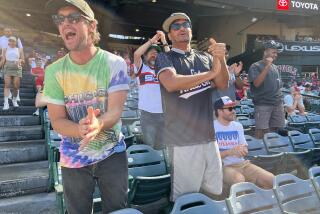Yet, All You Have to Say Is ‘1986’
- Share via
It was bound to happen eventually, another postseason clash between the Angels and the Boston Red Sox. The Angels, to their credit, forestalled it as long as they could, because their fans might not have been able to endure another without multiple painkillers -- the passage of 18 years and the amnesia-inducing champagne bliss of a World Series championship, an incredible cure-all, or so the Red Sox have heard.
So here they are again, the Red Sox and the Angels, engaged in a best-of-five-games playoff series -- and where was this format when Gene Mauch and Gene Autry really needed it, back in 1986?
Best of five in 1986 would have eliminated the Red Sox in four. The Angels won three of the first four games, including two starts by Roger Clemens during his first Cy Young Award season. That would have done it for the Angels.
Bobby Grich, author of the Game 4-winning 11th-inning single, would have been the hero.
Bill Buckner would have packed up his glove and gone home for the winter. Maybe he would have turned on the TV and watched Mookie Wilson take his cuts in the World Series against Mike Witt.
Best of all, from the Angels’ perspective: There would have been no Game 5.
Game 5. For the Angels and their fans, for more than a decade and a half, those words carried the same bone chill as “Ground ball to Buckner” does in Boston.
Where were you on the Sunday of Oct. 12, 1986? I was in the football press box high above the third base dugout inside Anaheim Stadium, watching in disbelief as the Angels jogged out to their defensive positions to begin the top of the ninth inning, protecting a 5-2 lead.
They were three outs away. Despite being weighted down with enough karmic baggage to flatten the ballpark -- the blown playoff of ‘82, the collapse of Mauch’s Philadelphia Phillies in ‘64, the laughable trades, a quarter-century of luck ranging from bad to tragic -- the Angels, amazingly, were three outs from reaching their first World Series.
Just then, the phone at my seat rang.
It was Pete Schmuck of the Orange County Register, a fellow Angel beat writer, calling from the press box behind home plate, lowering his voice to mimic that of the late, great P.A. announcer John Ramsey:
“Ladies and gentlemen ... “ he began.
“Please be prepared ...
” ... for the greatest disappointment of your lives.”
We both laughed. That’s how it was with the Angels in their 26th season. Even in the best of times, you’d best be ready for the worst of times, because they always seemed to lurk just one pitch away.
We laughed, because we had grown up on Angel baseball. There were the lonely pilgrimages to the Big A in the early 1970s, when last place was an ever-present reality, but a ticket to a Nolan Ryan start represented endless possibilities. You might see Ryan strike out 16. You might see Ryan throw a one-hitter. Or you might see Ryan strike out 16 and throw a one-hitter and lose on an infield error.
And on the nights Ryan didn’t start, you could get a very good seat to watch some very bad baseball.
The team improved in the early 1980s, which proved a double-edged sword to fans. Falling out of the race by late July was much easier to take than the crushing defeats of September and October. The Angels blew a 2-0 series lead to Milwaukee in the five-game 1982 American League championship series. They finished three games out of first in 1984 and one game back in 1985, the result of an agonizing final-week swoon.
But there they were, in the ninth inning of Game 5, at the threshold.
The Red Sox opened the inning with a single by Buckner. Witt, the Angels’ 18-game winner, then 25 and at the peak of his career, came back to strike out the next hitter, Jim Rice. Two outs away.
A few local writers familiar with the landscape remarked how amazing it was, imagining this long-cursed franchise actually participating in a World Series. This struck another writer, who did not grow up in Southern California, as odd. What’s so amazing about it, he wanted to know. Hadn’t the Royals, the Padres and the Brewers made it to three of the previous four World Series? If they could win the pennant, why not the Angels?
Then, Don Baylor, a former Angel, drove a Witt pitch over the left-center-field fence. Angels 5, Red Sox 4.
The discussion had quickly picked up some fairly persuasive visuals.
Witt got the second out, an infield popup by Dwight Evans. The crowd sensed that this was it; Angel fans rose from their seats, pumping up the volume to ear-rattling levels. The players sensed it too; Angel designated hitter Reggie Jackson took off his cap and slipped his glasses inside a pocket, bracing for the delirious field invasion that was certain to follow.
Inside the Angel clubhouse, locker stalls were draped with plastic wrap to defend against the blasts of champagne bottles already jammed into tubs full of ice.
An AL championship series most-valuable-player cap had been set aside for Angel center fielder Gary Pettis.
Red Sox catcher Rich Gedman stood between Witt and the World Series. At least until Angel pitching coach Marcel Lachemann reached the mound, standing between Witt and Gedman.
“Gene,” muttered one writer who knew the manager well, “don’t start managing now.”
Too late. Mauch checked his notes on Witt versus Gedman. In three previous at-bats against Witt, Gedman had homered, doubled and singled. Mauch had Gary Lucas and Donnie Moore warming up in the bullpen. Lucas had struck out Gedman in the seventh inning of Game 4 and again during a crucial situation during the regular season. Mauch made his move: Lucas would pitch to Gedman.
And hit Gedman, with his very first pitch.
It couldn’t be happening again. Could it?
Suddenly, the inning, and the Angels’ season, began to spin dizzily out of control. Mauch summoned Moore, his sore-armed, overworked relief ace, to pitch to Dave Henderson, a reserve outfielder with a .196 regular-season batting average for the Red Sox. Moore worked the count to 2-and-2 -- one strike away. Henderson fouled a pitch off. Moore then hung a split-fingered fastball that Henderson pounded over the fence for a two-run home run and a 6-5 Red Sox lead.
It remains the most infamous home run in Angel history -- and for the Red Sox, a lightning bolt of good fortune that conveniently gets ignored during the perennial Bambino-Buckner-Bucky Dent-Aaron Boone-Grady Little woe-is-us trail of tears.
The passage of time, coupled with selective memory, has painted Moore as the Man Who Blew the Pennant for the Angels. Often forgotten is how the Angels tied Game 5 in the bottom of the ninth -- and botched a chance to win it then.
After singling home the tying run, Rob Wilfong inexplicably froze at first base as the throw from right field headed home, too late to beat Ruppert Jones’ scoring slide. Had Wilfong advanced to second on the throw home, he’d have had a decent chance of scoring on Dick Schofield’s ensuing single.
As it was, Doug DeCinces, who had 26 home runs and 96 runs batted in during the regular season, had a chance to bring home the decisive run with one out and the bases loaded. Pitching for the Red Sox: Steve Crawford, a rookie so nervous about making his first postseason appearance that after the game he joked, “If there was a toilet on the mound, I would have used it.”
Crawford had pitched to two hitters and hadn’t gotten an out, yielding Schofield’s single and intentionally walking Brian Downing.
DeCinces swung at the first pitch he saw from Crawford, hitting a fly ball to shallow right field, to Evans, then the owner of one of the strongest outfield arms in baseball. Wilfong had no chance to tag and score from third, and the threat ended when Grich hit a soft liner to Crawford for the third out.
The Red Sox won in 11 innings, 7-6, extending the series to a sixth game and sending it back to Boston. For the Angels, the situation looked grim, although Mauch did his best to maintain an upbeat facade. The predicament wasn’t hopeless, the manager said, though he quipped that he might be homeless.
“I got no place to sleep tonight,” Mauch deadpanned. “I bet my house that DeCinces would get that run in from third.”
The Angels still had two chances to win the pennant in Boston, but realistically, they had no chance. Grich said he feared the Angels “may have awakened New England” by letting Game 5 slip away, and he was right. Emotionally gutted, the Angels lost the final two games by scores of 10-4 and 8-1.
“I guess,” a despondent Downing said in the visitors’ clubhouse after Game 7, “the curse got us again.”
The Red Sox went on to the World Series, visiting their own house of horrors inside Shea Stadium. The Angels? For years, it seemed the franchise would never be able to recover. They went 16 years before returning to the playoffs, long enough to turn over the roster a number of times, bringing in players who knew nothing of the curse and a former Dodger catcher, Mike Scioscia, to manage them.
Incredibly -- and it remains a feat vastly underappreciated outside of Southern California -- the Angels pulled off their World Series miracle in 2002. To many Angel fans, who’d already accepted they’d never see it during their lifetimes, the cosmic ledger was balanced then.
So it’s the Red Sox against the Angels in October again. But it isn’t curse versus curse, not this time.
No matter what happened in 1986, no matter what happens in the next three to five games, the Angels will always have 2002. It’s a strong anesthetic. The Red Sox, once again, are hoping to find some way to get their own sample.
More to Read
Go beyond the scoreboard
Get the latest on L.A.'s teams in the daily Sports Report newsletter.
You may occasionally receive promotional content from the Los Angeles Times.






